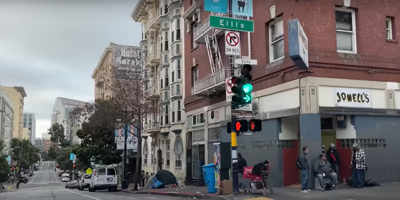
Tenderloin neighborhood, San Francisco
SAN FRANCISCO - A group suing the city of San Francisco over conditions in the beleaguered Tenderloin neighborhood have filed a new motion in hopes of convincing a federal judge to bar the government from enabling the distribution and use of fentanyl in that area.
In March 2024 a group of residents and businesses first sought a court order requiring the city to address rampant crime and sanitation issues in the famously gritty neighborhood and end an alleged unwritten policy seeking to contain open air drug dealing and other criminal and dangerous behavior there.
Attorneys with the firms of Walkup Melodia Kelley & Schoenberger, of San Francisco, and Kline & Specter, of Philadelphia, filed the complaint on behalf of residents identified only as Jane, Mary, Susan, John and Barbara Roe, some of whom are identified as immigrants, elderly and disabled. Other plaintiffs include businesses including Phoenix Hotel; Funky Fun, which operates a restaurant inside the Phoenix Hotel; and El Camino, which operates the Best Western Road Coach Inn.
Although he dismissed the initial complaint, in October U.S. District Judge Jon Tigar ruled in favor of the plaintiffs’ amended complaint after finding they made sufficient allegations concerning the government’s role in the condition of Tenderloin.
“Plaintiffs argue that the city’s acts, such as the operation of a congregate shelter which allows residents to use and sell narcotics; operation of narcotic consumption sites in the Tenderloin; instruction of SFPD to drop off addicts at the center; distribution or facilitation of the distribution of drug paraphernalia to addicts in the Tenderloin; and street-based support for those that reject shelter and live on the sidewalk have actively placed and encouraged addicts and dealers to come to the Tenderloin which was a substantial factor in producing the harm,” he wrote.
Now, in a motion filed Aug. 25, the plaintiffs argue the courts should stop the city “from directly or indirectly supplying fentanyl or methamphetamine-related drug paraphernalia to any individuals, groups, organizations, or entities within the Tenderloin neighborhood,” an order that would include stopping city-funded contractors from providing such paraphernalia.
The new motion alleges San Francisco’s “conduct attracts hardcore fentanyl and methamphetamine drug addicts” so the government and vendors can provide what it calls housing first shelter options and harm reduction services.
“Foreseeably, drug addicts swarmed the Tenderloin in response to the city’s offers of drug paraphernalia, drug consumption sites and shelter spaces that impose little to no rules with respect to behavior,” the plaintiffs said in their motion. “Equally foreseeable, violent, gang-affiliated drug dealers also converged on the neighborhood. As a result of the city’s recent change to its policies with its contractors distributing drug paraphernalia, the city has designated approved sites for its contractors to continue to furnish drug paraphernalia to the addicts who now habituate the Tenderloin’s sidewalks, or otherwise frequent the neighborhood. Tenderloin residents and businesses, including plaintiffs, have borne the brunt of this influx of addicts and dealers.”
The new motion includes testimony from Omar Ward, an online publisher of San Francisco drug use material; retired police officer Daniel Manning, who last served as acting captain of the Tenderloin Station; Tenderloin Street operations manager for the city’s emergency management department Mark Mazza; and other city employees identified by title but not name.
Those accounts primarily speak to the formal structure by which the city or affiliated agencies distribute various pieces of drug paraphernalia and describing the general nature and conduct of people who accept and use the material.
“The change in policy whereby fentanyl smoking kits are now handed out in nonpublic spaces, like the Glide parking lot or the SF AIDS and Hospitality House’s storefront locations, does not diminish the nuisance,” the plaintiffs wrote in their motion. “People who receive this paraphernalia use drugs in nearby public spaces. This is clear from Ward’s video of the storefront outside 172 Turk Street, Mary Roe’s eyewitness testimony of distribution resulting in consumption right outside her home” as well as a “reluctant admission” from the current health department director of Behavioral Health Services and Mental Health SF regarding drug use in public spaces.
The plaintiffs said their claim for private nuisance meets the required showing of an interference with the enjoyment of use and their property and that such interference is both substantial and reasonable, while also alleging the city had a role in creating a public nuisance. Among those allegations was the city’s publication of a flyer titled “Keep Our Streets Healthy and Safe” demonstrating an awareness of the potential for the outcomes the plaintiffs used as grounds for their motion.
“Plaintiffs have thus far managed to avoid significant physical injuries by exercising extraordinary personal vigilance while entering and exiting their homes and businesses and while trying to use the sidewalks in the Tenderloin,” the motion said. “They are constantly subjected to threatening words and conduct and unreasonable risks of harm when leaving their buildings or using public sidewalks. They are forced to inhale toxic fumes and smell highly offensive odors inside or right outside their property and they must dodge biohazardous materials. These constant intrusions into their daily lives constitute irreparable harm.”
Finally, the plaintiffs said the government has seen no benefit from giving pipes to addicts regardless of when, where or how such material is distributed, and argued the injunction they seek would not cost the city anything substantial while being in the best interests of the public at large. They also lodged a pre-emptive argument against what they expect will be the city’s attempt to claim immunity, alleging the state law under which the government says it operates doesn’t expressly sanction the conduct bolstering the allegations in the new motion.
“While there is a statutory exception for syringes and needles (which have uniquely powerful capacity to spread blood-borne pathogens), there is no such carve-out for pipes and other items that are used to smoke fentanyl or methamphetamine,” the plaintiffs wrote.
“Plaintiffs have found themselves at Ground Zero of a nuisance that has impacted the entire Tenderloin neighborhood. It is unclear what, if any, benefit accrues from the distribution of smoking paraphernalia. The harms are manifest.”
The city and county of San Francisco has not yet responded to the motion in court.








